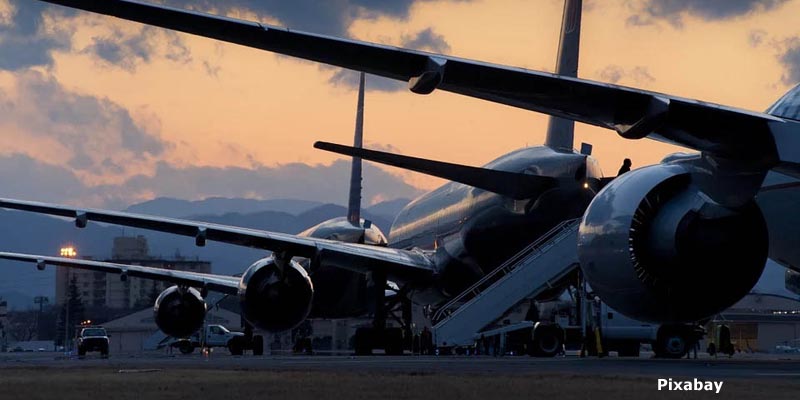The global aerospace industry, historically divided by trade disputes, has achieved a key victory: the United States and the European Union have reached a provisional agreement to exempt aircraft and their parts from tariffs. Announced on Sunday, the pact halts a direct threat to the production and delivery of aircraft on both sides of the Atlantic and culminates months of cooperation between rivals like Boeing and Airbus.
A Relief Amid Tensions
The decision comes just as the U.S. government was set to impose a 15% tariff on most European products. However, the aeronautical industry—one of the most vulnerable to trade conflicts—managed to secure protection. The agreement establishes zero tariffs for aircraft, engines, spare parts, and components ranging from landing gear to seats.
This avoids additional costs and potential disruptions in aircraft deliveries, at a time when supply chains are already strained. “We’re just waiting to see everything in writing,” a senior European industry official told Reuters, reflecting caution despite the optimism.
Discreet Lobbying, Concrete Results
The achievement was no accident. Heavyweight executives like Larry Culp, CEO of GE Aerospace, played a decisive role. In April, Culp met with President Donald Trump to emphasize the need to restore a tariff-free regime. As he told Reuters, the proposal was “understood” by the administration, highlighting that the zero-tariff regime had helped the U.S. achieve an annual aerospace trade surplus of $75 billion.
→ Unresolved Engine Anti-Ice System Issue Delays 737 MAX 7 and MAX 10 Certification Until 2026
Industry representatives argued that imposing tariffs on aeronautical components would not benefit Boeing over Airbus but would harm both, along with the entire global supply chain.
A (Partial) Return to the 1979 Agreement
The new framework seeks to revive key elements of the 1979 Agreement on Trade in Civil Aircraft, which had eliminated tariffs on planes and their parts. This is one of the few surviving sectoral exceptions since the creation of the World Trade Organization (WTO) in 1995.
However, two words were quietly removed from the official discourse: “multilateral” and “WTO.” This signals a shift toward bilateral agreements, aligning with the “America First” philosophy promoted by Trump, who once called the WTO “the worst trade deal ever made.”
An Unprecedented Transatlantic Campaign
What stands out is the unusual unity among competitors. Boeing and Airbus—protagonists in a 17-year subsidy dispute that tested the WTO until the 2021 truce—joined forces to protect the industry. Suppliers and airlines also rallied together.
Airbus welcomed the announcement, stating that “a stable and predictable trade environment is essential for such a globally integrated aerospace industry.”
The U.S. and UK: A Dress Rehearsal
A key preliminary step was the trade agreement reached in May between the U.S. and the UK, which restored free trade in aircraft engines. This deal served as a model for negotiations with the EU. Both Culp and Ed Bastian, CEO of Delta Air Lines, actively promoted this approach.
Mutual Market: Numbers Tell the Story
The scale of the transatlantic relationship in the sector is evident: Boeing delivers 17% of its aircraft to Europe, while Airbus sends 12% of its planes to the U.S., many of which are assembled locally. Additionally, the two blocs are each other’s largest markets for aeronautical components, according to data from the French lobby group Gifas.
Shadow of China and the Brazilian Threat
While this agreement removes one source of tension, it does not dispel all uncertainties. The U.S. Department of Commerce is still conducting a national security investigation (“Section 232”) into imports of aircraft, engines, and parts, with a focus on China. Concerns center on potential disruptions to critical supplies.
Moreover, this process could lead to new tariffs for Brazil, home to Embraer, whose regional jets face little competition. Currently, U.S. airlines face 50% tariffs on these aircraft, which, according to Embraer, could raise the price of each unit by up to $9 million. Alaska Air has already warned of potential delivery delays.
The U.S.-EU agreement represents a victory for Boeing, Airbus, and their suppliers, sending a clear signal that, in the face of geopolitical and economic challenges, even the oldest rivals can unite to defend common interests.
Related Topics
Etihad to Deploy Airbus A380 to Bangkok for First Time: Increased Capacity and Thailand Debut of “The Residence”
Air India Records Highest Rate of Technical Incidents in 14 Months During January
Embraer and Adani Defence & Aerospace Elevate Alliance: Agreement for an E175 Final Assembly Line in India
Lufthansa Group and Air India Sign MoU for Joint Business Agreement Following EU-India Free Trade Deal
Plataforma Informativa de Aviación Comercial con 13 años de trayectoria.
